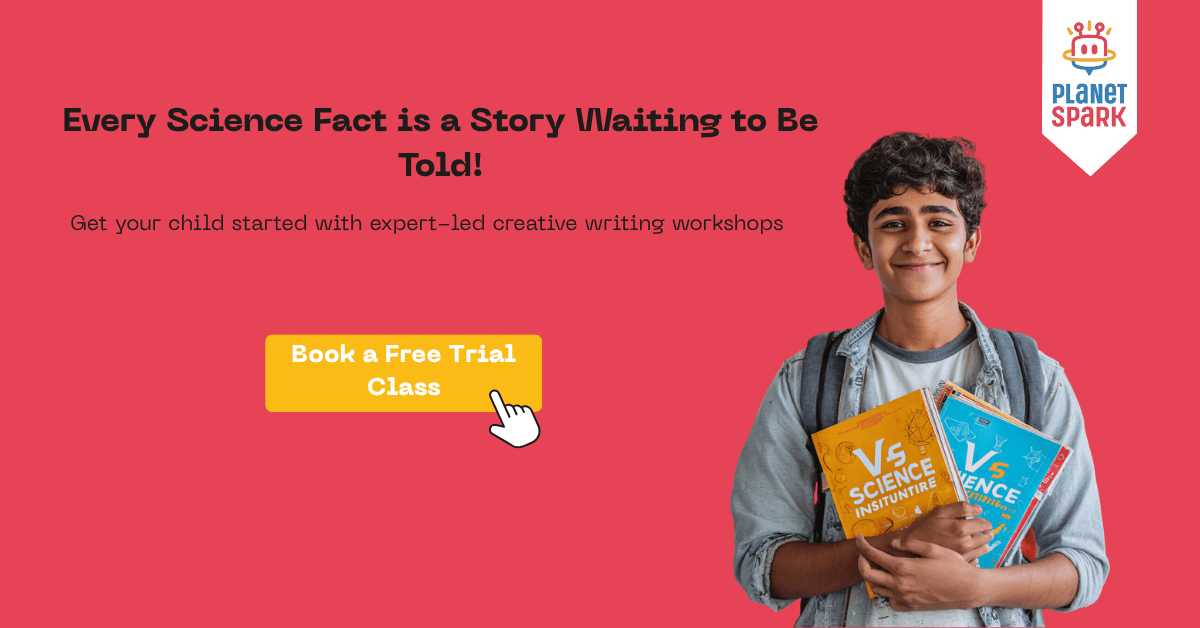Mind-Blowing Science Facts in English for Every Child

Science is everywhere around us from the sun that rises every morning to the mobile phones in our pockets. Whether you're a student, a curious thinker, or a budding scientist, learning Science facts in English not only improves your knowledge but also builds your vocabulary and communication skills.
In this blog, we’ll know some jaw-dropping science facts, categorized under different branches like physics, biology, chemistry, space, and earth sciences.
Plus, we’ll show how you can turn these fascinating facts into engaging creative writing pieces by using PlanetSpark’s unique learning approach.

What is Science?
Before we get into the fun stuff, let’s understand what science really means.
Science is the systematic study of the natural world. It helps us understand how things work through observation, experimentation, and logic. The more we learn, the more we discover how incredible the universe truly is.
Now let’s explore some incredible Science facts in English across various domains!
Space Science Facts in English
The Sun is actually white, not yellow!
Although it appears yellow from Earth, sunlight is composed of all colors—combined, they make white.One day on Venus is longer than a year on Venus.
Venus takes about 243 Earth days to rotate once, but only 225 Earth days to orbit the Sun.There are more stars in the universe than grains of sand on all Earth’s beaches.
The observable universe contains over 200 billion galaxies, each with millions or billions of stars.Neutron stars are insanely dense.
A single teaspoon of neutron star material would weigh about 6 billion tons.Jupiter has 95 confirmed moons.
This gas giant leads our solar system in the moon count, and scientists are still discovering more!
Biology Facts in English
Your body has more bacteria than human cells.
While the numbers are almost equal, your microbiome plays a vital role in digestion and immunity.Octopuses have three hearts and blue blood.
Two hearts pump blood to the gills, and one to the rest of the body. Their blood contains copper, making it blue.A sloth can hold its breath longer than a dolphin.
Sloths slow their heart rate to hold their breath for up to 40 minutes!Your stomach gets a new lining every few days.
This is to prevent the stomach from digesting itself with its strong acids.Bananas are berries, but strawberries aren’t.
In botanical terms, bananas meet the berry criteria, while strawberries don’t.
Chemistry Facts in English
Water can boil and freeze at the same time.
At a special condition called the “triple point,” all three states (solid, liquid, gas) of water exist simultaneously.Helium can escape Earth’s gravity.
Being the second-lightest element, helium can float away into space over time.The only letter not in the periodic table is ‘J’.
Fun fact for your vocabulary!Your body produces enough carbon to make 9,000 pencils.
If you extracted all the carbon in your body, that’s how many pencils you could make.Hot water freezes faster than cold water.
Known as the Mpemba effect, this strange phenomenon still baffles scientists.
Earth Science Facts in English
Mount Everest grows about 4mm taller each year.
Due to tectonic activity, the Himalayas are still rising!Lightning is five times hotter than the sun’s surface.
A lightning bolt can reach temperatures of 30,000 Kelvin.Earthquakes can turn water into gold.
Under pressure, earthquakes can vaporize water and cause gold to deposit from the minerals inside.The Sahara Desert was once a lush green forest.
About 6,000 years ago, it received regular rainfall and had rivers and vegetation.Antarctica holds 90% of Earth’s fresh water.
Despite being a frozen desert, it’s crucial to our planet’s freshwater supply.
Science and Creative Writing: A Perfect Match
Let's not restrict your kid's mind into just book but let it move freely with creativity. You might wonder, “How can I use these science facts in English creatively?”
This is where PlanetSpark’s Creative Writing Program comes in. Here’s how kids turn science knowledge into stories, essays, and poems:
Use Science to Write Fiction: Imagine writing a sci-fi story using the fact that “Venus has a day longer than its year.” What if a space explorer got stuck on Venus and time started to feel weird? This becomes the plot for an adventure.
Science Poems and Riddles: Turn facts like “sloths can hold breath longer than dolphins” into rhyming poems or quirky riddles. Creative exercises like these help build vocabulary, rhythm, and imagination.
Write Persuasive Science Essays: Topics like “Should humans colonize Mars?” or “Why is saving water crucial?” let kids explore scientific reasoning while structuring compelling arguments using the PEEL technique (Point, Evidence, Explanation, Link).
Engage with S.T.O.R.Y. Structure: PlanetSpark teaches children to use the S.T.O.R.Y. structure:
S: Setup
T: Trouble
O: Outcome
R: Resolution
Y: Your Message
This is great for crafting stories around scientific mysteries or futuristic technology.
From Black Holes to Banana Facts, Let’s Write About It!
Join our interactive writing class where science meets storytelling.
Bonus Fun Science Facts in English
Sharks are older than trees.
Sharks have been around for 400 million years; trees for about 350 million.A bolt of lightning contains enough energy to toast 100,000 slices of bread.
You can’t burp in space.
Due to lack of gravity, gas doesn’t separate from food inside your stomach in space.The Eiffel Tower can grow taller in summer.
Due to metal expansion from heat, it can be 15 cm taller!There are more atoms in a glass of water than stars in the universe.
How PlanetSpark Makes Science Writing Exciting
PlanetSpark’s Creative Writing classes are not just about writing better—they’re about thinking better. Here's how they help kids turn facts into fascination:
Genre-Based Curriculum
Kids explore science fiction, essays, poems, and journals, all while improving language structure, coherence, and fluency.
Creativity Stimulus Activities
Story dice, prompt cards, and visuals help children imagine new worlds and scientific wonders.
Real Publishing Opportunities
Students get to publish their science-themed stories on PlanetSpark blogs or anthologies, building confidence and pride.
Integrated Writing + Speaking
Children present their work through oral storytelling, boosting both their scientific vocabulary and public speaking confidence.

Conclusion
Science is not just about memorizing facts it's about understanding the universe and expressing that wonder through words. Whether it's the boiling point of water or the mystery of black holes, these Science facts in English can become seeds for writing, thinking, and speaking more creatively.
Help your child become not just a learner but a science storyteller. Whether they dream of being an astronaut, a doctor, or a bestselling author, it all starts with curiosity and the right kind of education.
Frequently Asked Questions
Q. Why should kids learn science facts in English?
A. Learning science facts in English improves vocabulary, critical thinking, and cross-subject understanding. It makes children better readers, writers, and communicators.
Q. Can science be a part of creative writing?
A. Yes, Science concepts can be transformed into stories, persuasive essays, or poems, fostering both analytical and imaginative thinking.
Q. How can PlanetSpark help in writing about science?
PlanetSpark teaches children how to write structured content, build arguments, and use vivid imagination. Their programs blend scientific knowledge with expressive skills.
Q. What age group is this suitable for?
A. PlanetSpark’s Creative Writing and Public Speaking classes cater to children aged 6 to 14 years.
Personalized Communication Report
Record a video to get a AI generated personalized communication report for your child

Hi There, want to try these
tips for your child with
LIVE with our expert coach?
Let's check your child's
English fluency
